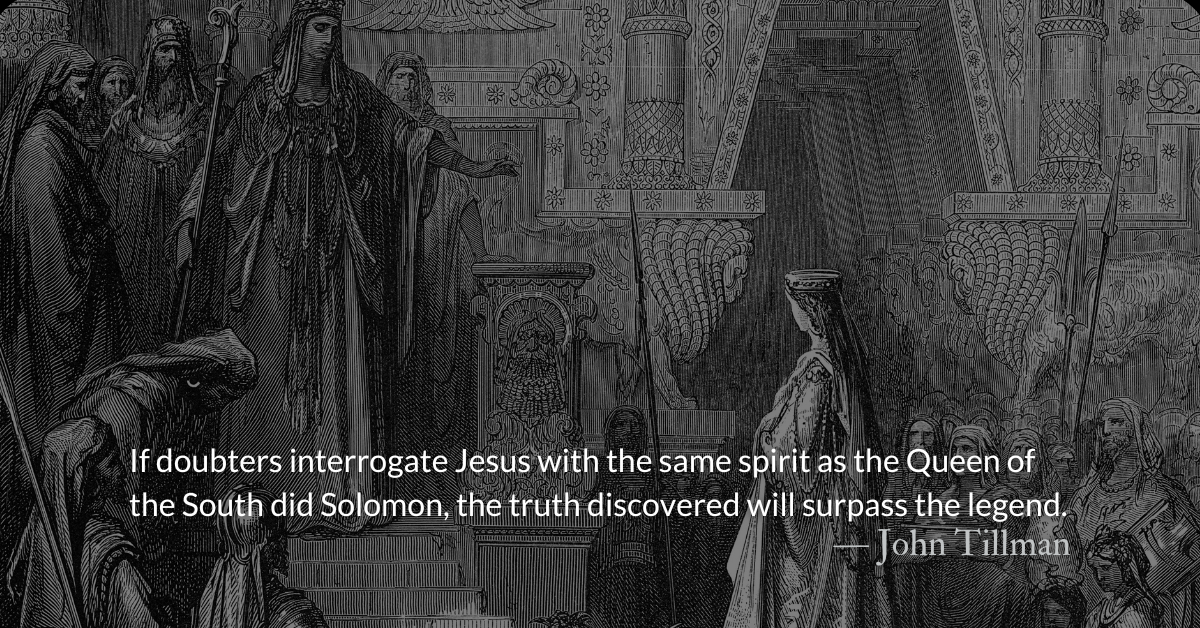Scripture Focus: 1 Kings 10.1-7
1 When the queen of Sheba heard about the fame of Solomon and his relationship to the Lord, she came to test Solomon with hard questions. 2 Arriving at Jerusalem with a very great caravan—with camels carrying spices, large quantities of gold, and precious stones—she came to Solomon and talked with him about all that she had on her mind. 3 Solomon answered all her questions; nothing was too hard for the king to explain to her. 4 When the queen of Sheba saw all the wisdom of Solomon and the palace he had built, 5 the food on his table, the seating of his officials, the attending servants in their robes, his cupbearers, and the burnt offerings he made at the temple of the Lord, she was overwhelmed.
6 She said to the king, “The report I heard in my own country about your achievements and your wisdom is true. 7 But I did not believe these things until I came and saw with my own eyes. Indeed, not even half was told me; in wisdom and wealth you have far exceeded the report I heard.
Matthew 12.42
42 The Queen of the South will rise at the judgment with this generation and condemn it; for she came from the ends of the earth to listen to Solomon’s wisdom, and now something greater than Solomon is here.
Reflection: Truth That Surpasses the Legend
By John Tillman
Solomon, with no enemies of consequence, settled in the peace established by his father, had great opportunity, great wealth, and was blessed with great wisdom. Using these gifts, he pursued God through the building of the temple. He also pursued answers to life’s great questions, as cataloged in Ecclesiastes.
Solomon, like many leaders, eventually fell into corruption, however, for a time, he was a great influence on the world. He was a legend in his own time. There are many legends of ruthless, rich, and powerful kings. Solomon’s legend, in contrast, was about “his relationship with the Lord.”
The Queen of Sheba came to evaluate that legend. Like any noble visitor, the queen carried expensive gifts, but the most precious cargo to her was an exacting examination of puzzles and riddles. A doubter, she debated with Solomon, attended banquets, and observed his worship at the Temple.
It is likely that people we know have big and difficult questions about faith. We may feel queasy about people’s questions. We aren’t Solomon’s equal in any realm, much less that of wisdom. What if we don’t know the answers?
We don’t need to fear questions, even if we don’t know the answers. Someone greater than Solomon is here with us—Jesus.
Every time Jesus mentions Solomon, it’s to point out something greater than Solomon. A flower’s glamour exceeds Solomon’s robes and the wisdom of Jesus’ teaching exceeds that of Solomon.
We may not be as widely known as Solomon, as wealthy, or as wise. But followers of Christ have some commonalities with Solomon. Because of Christ, we are settled at peace with God the Father. We have no enemies of consequence who can break through his protection. We are blessed through the Holy Spirit with the wealth and wisdom of Christ. His mind, his love, and his wisdom are accessible to us. Using these gifts we can pursue God, serving and worshiping him in the temple of our bodies and that of the universal church. We also can proclaim that answers to life’s great questions are found through Christ in the Bible.
Accept unbelievers’ questions as precious gifts. When they express doubts, honor and respect their vulnerability. Humbly admit your own doubts or ignorance. Speak of Jesus—encourage them to seek him. If doubters interrogate Jesus with the same spirit as the Queen of the South did Solomon, the truth discovered will surpass the legend.
From John: A ministry I have become familiar with in the past couple of years that welcomes doubters and their questions as precious gifts is called Alpha. During the pandemic (when we had to do them on Zoom) I helped with launching the first Alpha courses at the church I attend and our church is still hosting them in person and now off-site in the community with great success. If you are in the DFW area, check out my church’s Alpha and if not, find one near you to attend and invite your doubtful friends to attend with you.
Divine Hours Prayer: The Greeting
I will confess you among the peoples, O Lord; I will sing praises to you among the nations.
For your loving-kindness is greater than the heavens, and your faithfulness reaches to the clouds. — Psalm 108-3-4
– From The Divine Hours: Prayers for Summertime by Phyllis Tickle.
Today’s Readings*
Ezekiel 7(Listen 4:32)
Romans 10(Listen 3:21)
This Weekend’s Readings
Ezekiel 8(Listen 3:21), Romans 11(Listen 5:23)
Ezekiel 9(Listen 2:05), Romans 12(Listen 2:58)
*We have diverted into 1 Kings and Ephesians for this week. Devotionals on our daily readings will continue next week.
Read more about Solomon’s Folly
None of us are Solomon but…Any of us can apply a God-given skill, like wisdom, in a foolish and sinful way.
Read more about God of the Weak and Doubtful
You who doubt… He calls. He loves. He holds out his hand, and trusts the gospel, to all of us doubters.









